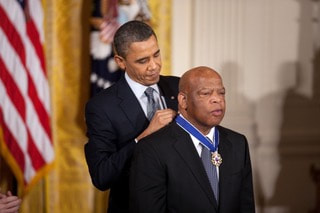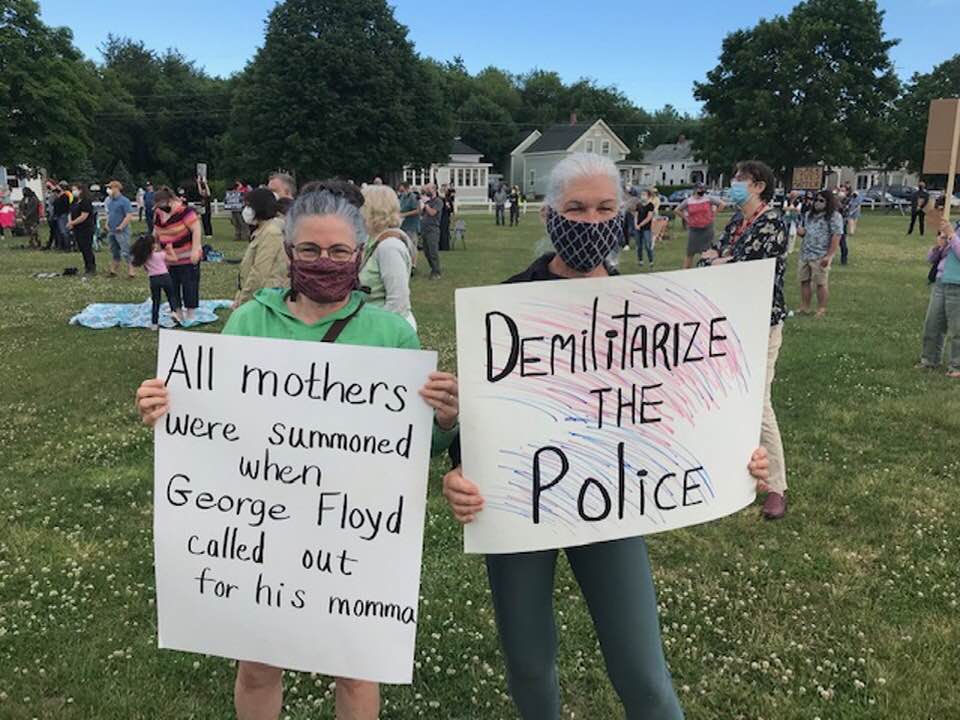Social Justice
A Conversation with Black Lives Matter Leaders in NH
|
Stay Work Play, an nonprofit organization whose mission is to attract and retain more young people here in NH, held a thoughtful conversation with leaders of BLM Manchester about their experiences as people of color in a predominately white state. You can view the conversation here.
|
|
A Tribute to Congressman John Lewis
 President Obama honors John Lewis with the Presidential Medal of Freedom.
President Obama honors John Lewis with the Presidential Medal of Freedom.
by Bob Perry, former Chair, Strafford Town Democrats
My personal memories with John Lewis, October, 2016
Parking was tight. The room was crowded. Overcrowded. All rooms in this home were overcrowded. It was an event not to be missed.
Former Congresswoman Carol Shea-Porter had invited a dear friend and colleague in congress to help raise money for her re-election. Happy to do so, Congressman John Lewis appeared at a private home in Lee, NH, to assist his good friend and colleague in Congress, who went on to win her re-election. Democrats were excited that such a good man, a humble man, an icon of the civil rights era and current leader in congress was available for conversation and handshakes. I was equally excited to shake the hand of Congressman John Lewis. I brought my mother and another senior to share the excitement. While I shook his hand, I announced he was an American treasure. I was grateful I had the opportunity to connect so directly and personally with history ... the right side of history.
John Lewis' lifelong objective was to create a more perfect union, to establish what had been promised blacks and all persons of color on March 30, 1870, at Article XV, Section 1 of the United States Constitution:
Section 1:
"Right of Certain Citizens to Vote Established - The right of citizens of the United States to vote shall not be denied or abridged by the United States or by any States, on account of race, color, or previous condition of servitude.
Section 2:
"Congress Given Power to Enforce this Article - The Congress shall have power to enforce this article by appropriate legislation."
Ignoring Constitutional law, as above, rights of persons of color to vote continued to be denied, sometimes by requiring them to take complicated tests, recite lengthy oratories, guess the number of marbles or soap suds in a jar, outright denial of registration, blatant intimidation, and death as punishment for attempting to vote or attempting to register voters.
In 1965, in another effort to visit equality and voting rights upon the oppressed, President Lyndon Johnson signed into law the Voting Rights Act of 1965.
It is inexplicable, therefore, that, in 2013, the Supreme Court of the United States neutered the keystone provision in the Voting Rights Act of 1965 by repealing Article 5, justifying its ruling by concluding that minority voter protections were no longer needed; that voter suppression among people of color was a thing of the past. Yet, it was publicly known at the time that many states, like Texas, were in the process of denying the franchise, through various means, to people of color. Through repeal of Article 5, the door was opened wide once again for certain legislators to silence the voice and dignity of certain Americans, by denying them access to the ballot box.
It is particularly egregious that Senator Mitch McConnell of the United States Senate continues to deny his members the traditional senate process of debate, amendment, and vote on a bill passed by the United States House of Representatives which was sent to his chamber by the Democratic majority on 12.9.19, that would reinstate the principles within the original Voting Rights Act. HR-4 is known as the Voting Rights Advancement Act of 2019.
Even in the Granite State, there are legislators who refuse to accept the mere three elements required for voting under the NH Constitution - U.S. citizenship, age 18 and up, domicile (and subsequent amendments) and by doing so restrict that fundamental right by legislating complex and unwarranted hurdles to the ballot box, which in the case of Senate Bill 3 took years for the judicial branch to sort out.
Given that there are those in power who do not believe in equality or that all who satisfy the prongs of the NH Constitution, as amended, have the right to vote, the civil rights era is not a thing of the past; it's a thing for all time.
Recent tributes to the man and his cause show us a person of true courage, and an ideal, sadly, that remains unfulfilled.
My personal memories with John Lewis, October, 2016
Parking was tight. The room was crowded. Overcrowded. All rooms in this home were overcrowded. It was an event not to be missed.
Former Congresswoman Carol Shea-Porter had invited a dear friend and colleague in congress to help raise money for her re-election. Happy to do so, Congressman John Lewis appeared at a private home in Lee, NH, to assist his good friend and colleague in Congress, who went on to win her re-election. Democrats were excited that such a good man, a humble man, an icon of the civil rights era and current leader in congress was available for conversation and handshakes. I was equally excited to shake the hand of Congressman John Lewis. I brought my mother and another senior to share the excitement. While I shook his hand, I announced he was an American treasure. I was grateful I had the opportunity to connect so directly and personally with history ... the right side of history.
John Lewis' lifelong objective was to create a more perfect union, to establish what had been promised blacks and all persons of color on March 30, 1870, at Article XV, Section 1 of the United States Constitution:
Section 1:
"Right of Certain Citizens to Vote Established - The right of citizens of the United States to vote shall not be denied or abridged by the United States or by any States, on account of race, color, or previous condition of servitude.
Section 2:
"Congress Given Power to Enforce this Article - The Congress shall have power to enforce this article by appropriate legislation."
Ignoring Constitutional law, as above, rights of persons of color to vote continued to be denied, sometimes by requiring them to take complicated tests, recite lengthy oratories, guess the number of marbles or soap suds in a jar, outright denial of registration, blatant intimidation, and death as punishment for attempting to vote or attempting to register voters.
In 1965, in another effort to visit equality and voting rights upon the oppressed, President Lyndon Johnson signed into law the Voting Rights Act of 1965.
It is inexplicable, therefore, that, in 2013, the Supreme Court of the United States neutered the keystone provision in the Voting Rights Act of 1965 by repealing Article 5, justifying its ruling by concluding that minority voter protections were no longer needed; that voter suppression among people of color was a thing of the past. Yet, it was publicly known at the time that many states, like Texas, were in the process of denying the franchise, through various means, to people of color. Through repeal of Article 5, the door was opened wide once again for certain legislators to silence the voice and dignity of certain Americans, by denying them access to the ballot box.
It is particularly egregious that Senator Mitch McConnell of the United States Senate continues to deny his members the traditional senate process of debate, amendment, and vote on a bill passed by the United States House of Representatives which was sent to his chamber by the Democratic majority on 12.9.19, that would reinstate the principles within the original Voting Rights Act. HR-4 is known as the Voting Rights Advancement Act of 2019.
Even in the Granite State, there are legislators who refuse to accept the mere three elements required for voting under the NH Constitution - U.S. citizenship, age 18 and up, domicile (and subsequent amendments) and by doing so restrict that fundamental right by legislating complex and unwarranted hurdles to the ballot box, which in the case of Senate Bill 3 took years for the judicial branch to sort out.
Given that there are those in power who do not believe in equality or that all who satisfy the prongs of the NH Constitution, as amended, have the right to vote, the civil rights era is not a thing of the past; it's a thing for all time.
Recent tributes to the man and his cause show us a person of true courage, and an ideal, sadly, that remains unfulfilled.


